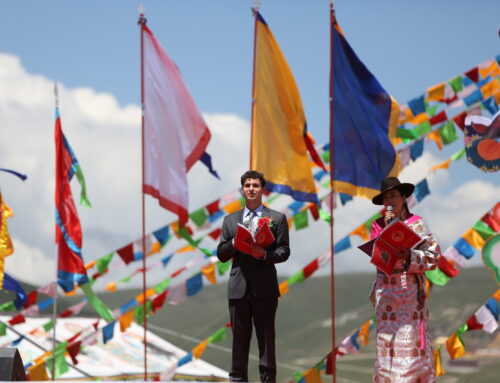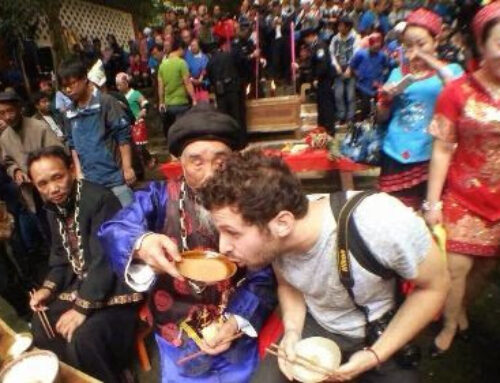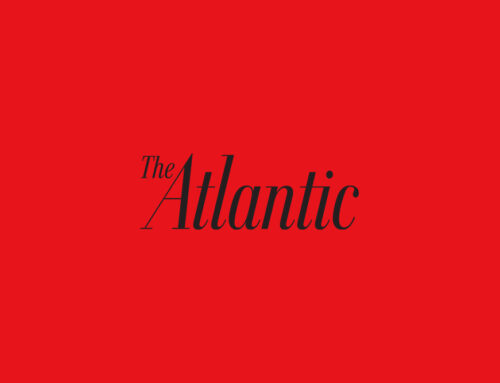LESSONS FROM THE NEAR FUTURE
Fear and Desire
We are all coping in one way or another with fear: fear of the unknown, unseen, and unpredictable.
In China’s post-quarantine period, I’ve watched two major impulses rise to the fore in response these fears. They play a large role in defining their attitudes towards work, spending, school, their government and beyond.
These fear responses are two sides of the same coin: the fear that the careful balance of our lives—personal, financial, or otherwise—can be broken at a moment’s notice.
#1 In the beginning, our response to fear may guide us
Fear Response A
今朝有酒, 今朝醉
Jīnzhāo yǒu jiǔ, jīnzhāo zuì,
Today we have booze, so today we’ll get drunk
(Unknown poet, Tang Dynasty 619-907 A.D.)
Translation: Tomorrow isn’t promised, so enjoy life while you can. (Essentially the Tang Dynasty edition of YOLO.)
This group is looking to take back the months of life they missed and then some, within the confines of new rules. Everything they couldn’t do in quarantine—namely eating out, hanging out, having sex (and the dating and bars before the sex), regional travel, friends, and fun—they’re doing now. This has even led to the creation of a new word, “revenge shopping.”
This attitude is held by a distinctly younger group of people. Many Millennials in China feel they’re saving for a future that is far from guaranteed, an attitude I’ve heard echoed by my gen in the US. It’s this attitude that might be leading to crowded beaches in Florida and California.
In the last few days Chinese friends in Beijing, Shanghai, and Chengdu have sent video of dense crowds drinking and partying hard on club dance floors. Even though things have changed—they’re being temperature checked at the doors—there’s a group who wants to feel alive now more than ever.
Before the virus, this exact “live in the moment” ethos has powered China’s globally impactful consumer surge over the last five-ten years, particularly as Millennials have come of age. They’ve taken on the opposite attitude of their parents, who redefined the heights of a high savings rate.
Fear Response B
未雨绸缪
Wèi yǔ chóu móu
To thatch the roof while there are no rains.
Translation: Prepare for a rainy day. Live cautiously, as life is fragile.
Like America, the Chinese people are economically battered and bruised from the covid-19 pandemic. Unemployment is at a record high, the economy experienced Q1 negative GDP growth (-6.8%) for the first time since they began measuring it, and a huge number of small businesses evaporated with no customers.
My old morning dumpling stall owner in Chengdu texted me that they survived exactly 1 week after quarantine began. “Without the morning commuters, our business couldn’t last two weeks,” he said.
The amount of these anonymous mom-and-pop stores, vendors, and restaurants in cities you’ve never heard of that evaporated in the first weeks of lockdown is yet another reminder that, though we love to beam out blisteringly modern images of China and focus on the luxury buyers, much of China is still very much “developing.” (Play this quiz if you think your China city knowledge is up to par.)
Caution is king for many well-off and vulnerable alike, in economic retreat after being preyed upon by the vector surrounding the virus. McKinsey describes post-Quarantine Chinese consumers as “cautiously optimistic” and provides a few useful spending numbers. Though there is more support here through PPP and unemployment than in China, it is difficult to imagine that our first steps out of quarantine will be anything but cautious.
Several young people in 2nd tier cities have talked to me about dejection: they were finally making their way in the world with a respectable job that could pay off their apartment loans only to be knocked back down by the Sisyphean boulder of life. I worry about my generation here saddled with student debt, and the slippery financial and emotional slope of missing payments.
Materialism as a whole is also under scrutiny, as quarantine made many ask working in the intense 996 work culture in big cities (from 9am to 9pm 6 days a week) ask, “Wait…why am I doing this?”, exacerbating the existing trend of moving from 1st to 2nd or 3rd tier cities for worse pay but higher quality of life.
Both groups are also keenly aware of the potential for a second wave. The first are having fun in what feels like could be the eye of the storm. The second are battening down the hatches.
#2 Which Desires are Worth It?
You can learn a lot about the human spirit by what the mind desires under lockdown.
What is the first desire that springs to your mind? Which wants are most persistent, cropping up in conversation and Google searches, and even emerging through the mists of more intense covid-19 dreams?
Two desires have relentlessly risen to the surface in China: Food and travel.
The pre-requisite to enjoying either is shared trust. How will we rebuild trust after we’ve been told that contact with others could kill us? (More on how Chinese businesses are rebuilding social trust in the next note.)
What about sex? As a 30 year old, I am beginning to field texts from hormone addled friends complaining about 5-weeks without human contact. Many in China went 76 days.
Some Chinese sociologists believe the critical difference between the East and West is the difference between impulses towards food and sex: Eastern cultures are more driven towards food, and we’re more driven towards sex. (More on this in Young China).
If the food/sex paradigm plays out, based on China’s run on restaurants in recent weeks, we in the “West” should expect a major boom in dating apps, bars, and safe sex accouterments post-quarantine.
For many in China’s intense foodie culture, eating out has been worth the risk. Eating out is synonymous with “fun,” “friends,” and “not-at-home”, and it has tilted over into “worth it” in a post-quarantine world.
民以食为天
Mín yǐ shí wéi tiān
Food is the God of the People
(~200 A.D. History of the Former Han Dynasty)
Much more so than in the US, Chinese social media was flooded with “food porn,” long articles of the meals they would eat when they could leave the house. My favorite was titled “An Article that Will Move You” that circulated early February, during the depth of the medical crisis in China. I thought it would be one of the many articles about front-line responders. It was 20+ gifs of dipping dumplings, eggs oozing, and meat sizzling.
That pent-up energy has begun to flow into the formerly abandoned hot pot restaurants around the country, with social distancing and health checks in place.
Restaurant popularity is also about “second spaces.” Those of us in New York have faced the reality that the “city apartment experiment” is reliant on your ability to leave it. Restaurants, cafes, and famously fast food chains that don’t care how long you stay balance the equation on undersized apartments.
Travel is the other desire that is consistently top of mind in China towards the end of and after quarantine.
Despite travel being at the center of the news on viral spread, it has arisen as the perfect antidote to quarantine.
It is less expensive, more accessible, and comes with controllable risk. Anywhere that can be reached with a car or a carefully controlled train has become a destination for people who could not leave their homes during covid-19.
Expect regional travel to pick up in the US and globally after lockdown, and for the hotels and properties that take extra effort to put travelers at ease to win out.
China’s upcoming travel holiday (May 1-5) will tell us much about the resiliency of the traveler, how “trust” has changed, and how fast or slow the industry may rebound.
Many are returning to malls for food but skipping their favorite shops.
China’s e-commerce was already more advanced than the rest of the world, and those that weren’t using it were forced to try during quarantine.
Big purchases – cars and homes – and the “nice to haves” – retail they like but don’t love – are forcing people to take pause:
Do I need this now?
Does this fit into my new budget?
Did I dream about this during quarantine?






Leave A Comment